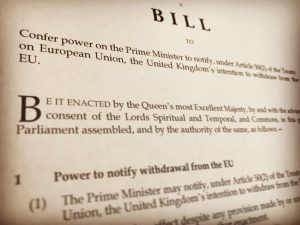By Miss Rose Slowe LLM, Senior Research Fellow (University of Bristol Law School).
 On 17 February 2017, Bindmans LLP published an Opinion that it had solicited from several leading authorities on EU law concerning Article 50 TEU. The so-dubbed ‘Three Knights Opinion’ put forward compelling legal arguments in support of why an Act of Parliament at the end of the Article 50 negotiation process is necessary in order to ensure that Brexit occurs in accordance with domestic and, by extension, EU law. These contentions, and Professor Elliot’s rebuttal, warrant careful consideration, not least because of the constitutional significance they pose.
On 17 February 2017, Bindmans LLP published an Opinion that it had solicited from several leading authorities on EU law concerning Article 50 TEU. The so-dubbed ‘Three Knights Opinion’ put forward compelling legal arguments in support of why an Act of Parliament at the end of the Article 50 negotiation process is necessary in order to ensure that Brexit occurs in accordance with domestic and, by extension, EU law. These contentions, and Professor Elliot’s rebuttal, warrant careful consideration, not least because of the constitutional significance they pose.
The Opinion was asked to address three questions: whether it was a ‘constitutional requirement’, within the meaning of Article 50(1), that Parliament authorise the final terms of any deal reached with the EU; whether the UK is able to validly notify its intention to withdraw from the EU, pursuant to Article 50(2), subject to such a requirement; and the legal consequences if that requirement is not satisfied. It is submitted, for reasons that will become apparent, that the latter question of consequence is effectively answered by examining the possibility of conditionality being attached to notice under Article 50, and this post accordingly considers the two issues together. (more…)

